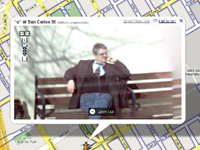Google urged to retouch Street View pictures
Obliged by privacy complaints, Google Inc. starts to automatically blur faces of people captured in the street photos taken for its Internet map program. Rolling it out will take several months, however.

Google Street View is a feature of Google Maps and Google Earth that provides 360° panoramic street-level views and allows users to view parts of selected cities and their surrounding metropolitan areas at ground level. When it was launched on May 25, 2007, only five cities were included. It has since expanded to more than 40 U.S. cities, and includes the suburbs of many, and in some cases, other nearby cities.
Although Google's Street View service was not the first to augment online maps with photos, the detail and breadth of images on the site surprised and unsettled many users.
Google Street View displays photos that were previously taken by a camera mounted on an automobile, and can be navigated using either the arrow keys on the keyboard or by using the mouse to click on arrows displayed on the screen. Using these devices, the photos can be viewed in different sizes, from any direction, and from a variety of angles. Lines that are displayed along the street that is shown indicate the direction followed by that street.
Thus, you can see ordinary people walking, entering buildings, falling of bikes, sunbathing, talking - everyday, in-public things but nonetheless, things they might not have wanted preserved for posterity.
Some privacy advocates, including the influential Electronic Frontier Foundation, suggested that Google blur the images of people. That move would not hinder Street View's goal of helping people become familiar with the look and feel of a location before they travel there.
This week, Google revealed it had indeed begun deploying a facial-recognition algorithm that scans photos for mugs to blur. The changes are happening first in scenes in New York, before slowly expanding to the other 40 cities in Street View.
Google spokesman Larry Yu said the company is still tweaking the system. For now it tends to err on the side of blurring too many things — things a computer erroneously interprets as faces — but that is better than leaving too many faces unblurred, Yu said.
Yu said Google was responding not only to privacy complaints in the U.S. , but also trying to head off legal or cultural objections that might emerge as Street View expands into other countries.
Rebecca Jeschke, a spokeswoman for the Electronic Frontier Foundation, praised Google's decision, but she added that "it's just a shame it didn't happen before the tool launched."
Subscribe to Pravda.Ru Telegram channel, Facebook, RSS!

